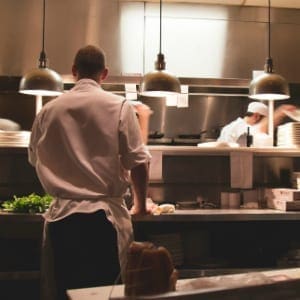 Hospitality is one of London’s largest industries; 21 per cent of the UK’s chefs work in London (55,000 chefs and cooks) and demand for chefs has been growing fast – the number of chefs in the city has tripled over the last 10 years.
Hospitality is one of London’s largest industries; 21 per cent of the UK’s chefs work in London (55,000 chefs and cooks) and demand for chefs has been growing fast – the number of chefs in the city has tripled over the last 10 years.
But despite this growth, London’s kitchens still struggle to recruit and retain chefs. Approximately 10 per cent of the UK workforce – around 20,000 chefs – leave the profession every year, while ‘chef’ is the most in-demand job title across London on the UK’s largest job website Indeed.
The report found that the growing demand for chefs has not been matched with expansion and improvement of culinary education and training.
London has a good provision of catering courses – 16 of London’s 48 further education colleges provide catering courses – but many employers don’t believe colleges prepare young chefs with the range of skills needed to thrive in the workplace.
The government’s apprenticeship scheme is also not delivering for the profession, with London behind the rest of the country. Just 660 chefs started a chef apprenticeship in London last year; 12 per cent of chef apprenticeships in England.
Students who successfully complete their education or training are met with tough working conditions. The report found:
- Low pay: in 2017/18, 50 per cent of London’s chefs earned under £21,000 a year, and 80 per cent earned under £28,000. This means that, after adjusting for inflation, the average hourly pay was no higher in 2017 than in 1997.
- Unpaid overtime and long working hours: the average working week is 50-60 hours in most restaurants, and it is not uncommon for chefs to work 80-100 hours at busy times of the year.
- Lack of flexible working and frequent sexism: women make up only 15 per cent of chefs in London’s restaurants, yet make up the majority of school, hospital or office cook positions which offer daytime shifts and more regular hours.
The challenges around recruitment are likely to be amplified in the coming years, as London’s restaurant scene is heavily reliant on migrant workers; around 85 per cent of London’s chefs were born abroad, compared to 50 per cent in the rest of the UK.
To ensure that London’s restaurants and the culinary sector continue to thrive, the report argues that London must take action to equip aspiring chefs with the skills and experience to succeed.
It recommends that London’s catering colleges should work with the Mayor of London and businesses to develop a two-stage culinary education system, with catering colleges brought together as a new London College of Food; a networked institution with several campuses across London, following the model of the University of the Arts London.
To make the chef profession more appealing to the next generation, the report argues that the sector must urgently address working conditions. It calls on London’s restaurants and food businesses to work with the Mayor of London to draft a long-term plan which would help them catch up to the Mayor’s Good Work Standard – including introducing family-friendly working practices, taking a zero-tolerance approach to discrimination, harassment and bullying, and paying all staff the London Living Wage.
Chefs should also work together to establish an Institute of Chefs and Cooks that would give the profession a strong voice and spread best practice, building on existing structures such as the Craft Guild of Chefs, the Institute of Hospitality and the Royal Academy of Culinary Arts.
Read the report here.















